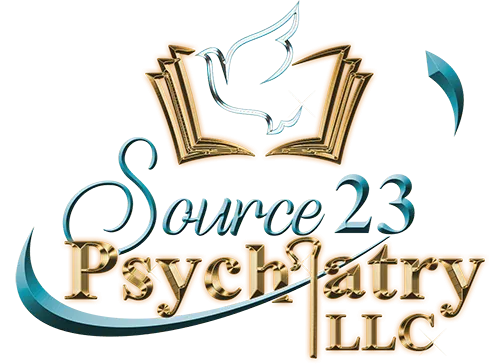How Cognitive-Behavioral Therapy (CBT) Gives You the Upper Hand Over Anxiety
The stress of anxiety puts a lot of strain on mental health, and getting it under control can be tricky — until you find cognitive behavioral therapy (CBT). Keep reading to discover how CBT works to control severe anxiety.
Fear is a normal response to something scary — unless it's taking over your life. If you're consumed by worry, affecting your everyday activities, you may live with an anxiety disorder.
Getting anxiety under control is the first step in controlling your mental health. A number of treatments are available, including cognitive behavioral therapy.
When you need assistance controlling anxiety, the team at Source 23 Psychiatry has treatments like CBT to help. Kimberly Gilbert, MSN, APRN, PMHNP-BC, leads our team and has years of experience with psychiatry and treatments.
Understanding anxiety
Anxiety is a typical reaction when facing something scary or new. For instance, you may have anxiety before giving a speech or on your first day of a new job.
However, anxiety isn't normal when it consumes your thoughts and takes over your life. When your mind is consumed with worry and stress over little things, you're likely living with an anxiety disorder.
There are various forms of anxiety disorders, including generalized anxiety and phobias. Panic disorder and social anxiety disorders are also part of the anxiety family.
If you're living with an anxiety disorder, negative thoughts overtake your life, and intense worry and avoidance of situations that trigger these feelings.
Anxiety changes jobs, personal relationships, and school performance. It's sometimes hard to get through the day when your mind is consumed with fear and worry.
Although anxiety is a severe mental health issue, plenty of treatments can help you get it under control. Cognitive behavioral therapy is effective for anxiety disorders.
What is cognitive behavioral therapy?
Cognitive behavioral therapy, or CBT, is a psychological treatment effective for many mental health issues, including anxiety and depression.
The main goal of CBT is to improve your quality of life and mental health. It can sometimes be more effective than other treatments, including medications.
CBT revolves around unhealthy thoughts and behaviors that affect your mental health and well-being. During CBT, you discuss your thoughts and ways to encourage positive thinking and change harmful behaviors.
You also learn coping mechanisms and problem-solving skills during CBT sessions. At each session, you and your therapist dig deeper into your thoughts and behaviors to start working toward changing those thoughts for a positive outcome.
Managing anxiety with CBT
CBT is a great and successful option when you're living with anxiety and need a practical solution. Medications also work. However, they don't fix the issue of harmful thinking long-term.
CBT helps you understand anxiety and cope with your negative thoughts and behaviors in various ways. A few of the techniques we use to give you the upper hand on anxiety disorders include the following:
Learn relaxation techniques
Relaxation exercises are an essential aspect of CBT for anxiety. Learning how to ease your mind through mindfulness, meditation, or yoga helps you manage your symptoms and avoid triggering your anxiety.
Identify negative thinking
The therapist helps you identify negative thoughts that lead to anxiety during CBT. Each thought provokes fear and worry, even though it may be irrational.
CBT allows you to identify irrational thinking and understand how they affect your feelings and behaviors, one negative thought at a time.
Analyze negative thoughts
After you identify negative thoughts that lead to anxiety, the therapist helps you analyze the thought and challenge it through realistic thinking.
CBT helps you analyze the negative aspects of your thinking to discover why you feel that way. It also allows you to look at these thoughts realistically to move forward.
Discuss realistic thoughts
The last step in changing your thoughts and behaviors is replacing negativity with realistic goals. During CBT, the therapist helps you swap out negative thoughts for realistic and positive ones, which helps ease your anxiety over time.
If you're struggling with anxiety and would like to learn more about your treatment options, don't hesitate to call Source 23 Psychiatry at 614-908-2721 to schedule your virtual or telehealth appointment today. You can also request your virtual appointment on the website.
Psychiatry & Telehealth located in Virtual Office, Columbus, OH
Source 23 Psychiatry, LLC
4449 Easton Way, Suite 200,
Columbus, OH 43219
Hours of Operation
Source 23 Psychiatry, LLC
Monday
9:00 am - 6:30 pm
Tuesday
9:00 am - 6:30 pm
Wednesday
9:00 am - 6:30 pm
Thursday
9:00 am - 3:00 pm
Friday
Closed
Saturday
10:00 am - 3:00 pm
Sunday
Closed
PSALM 23: 1-6
1 The Lord is my shepherd; I shall not want.
2 He maketh me to lie down in green pastures: he leadeth me beside the still waters.
3 He restoreth my soul: he leadeth me in the paths of righteousness for his name’s sake.
4 Yea, though I walk through the valley of the shadow of death, I will fear no evil: for thou art with me; thy rod and thy staff they comfort me.
5 Thou preparest a table before me in the presence of mine enemies: thou anointest my head with oil; my cup runneth over.6 Surely goodness and mercy shall follow me all the days of my life: and I will dwell in the house of the Lord for ever.

